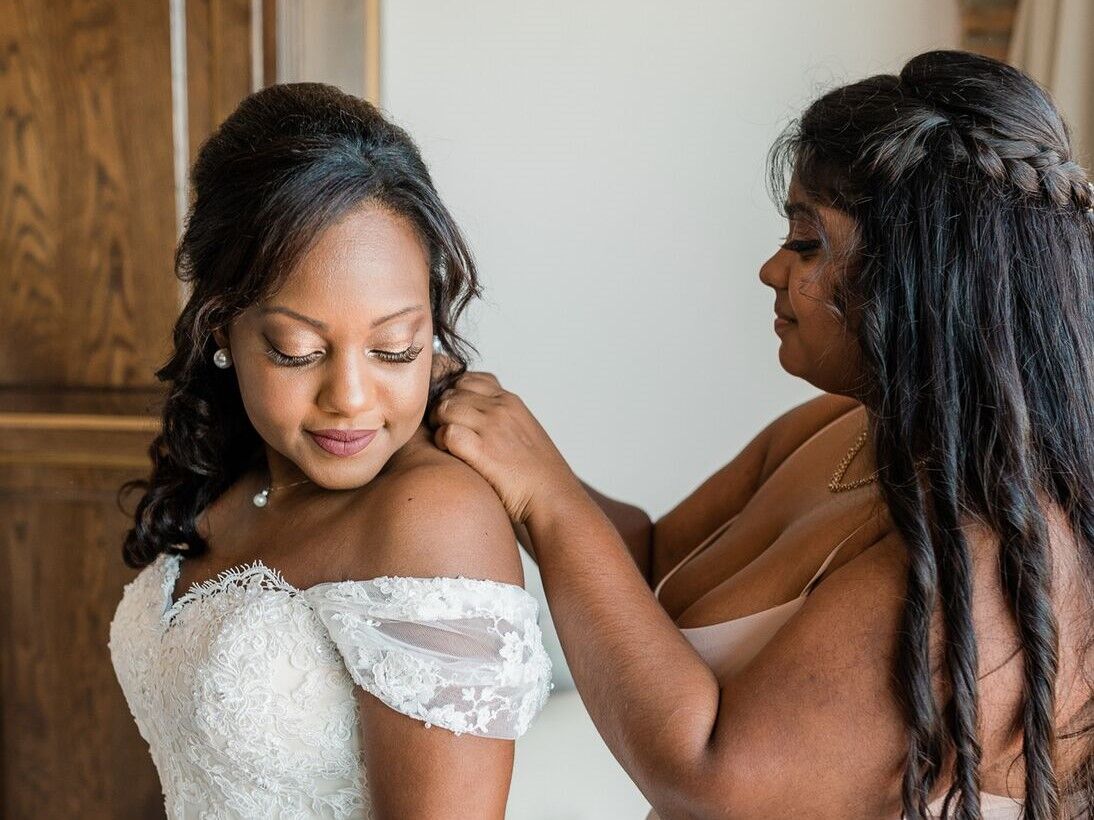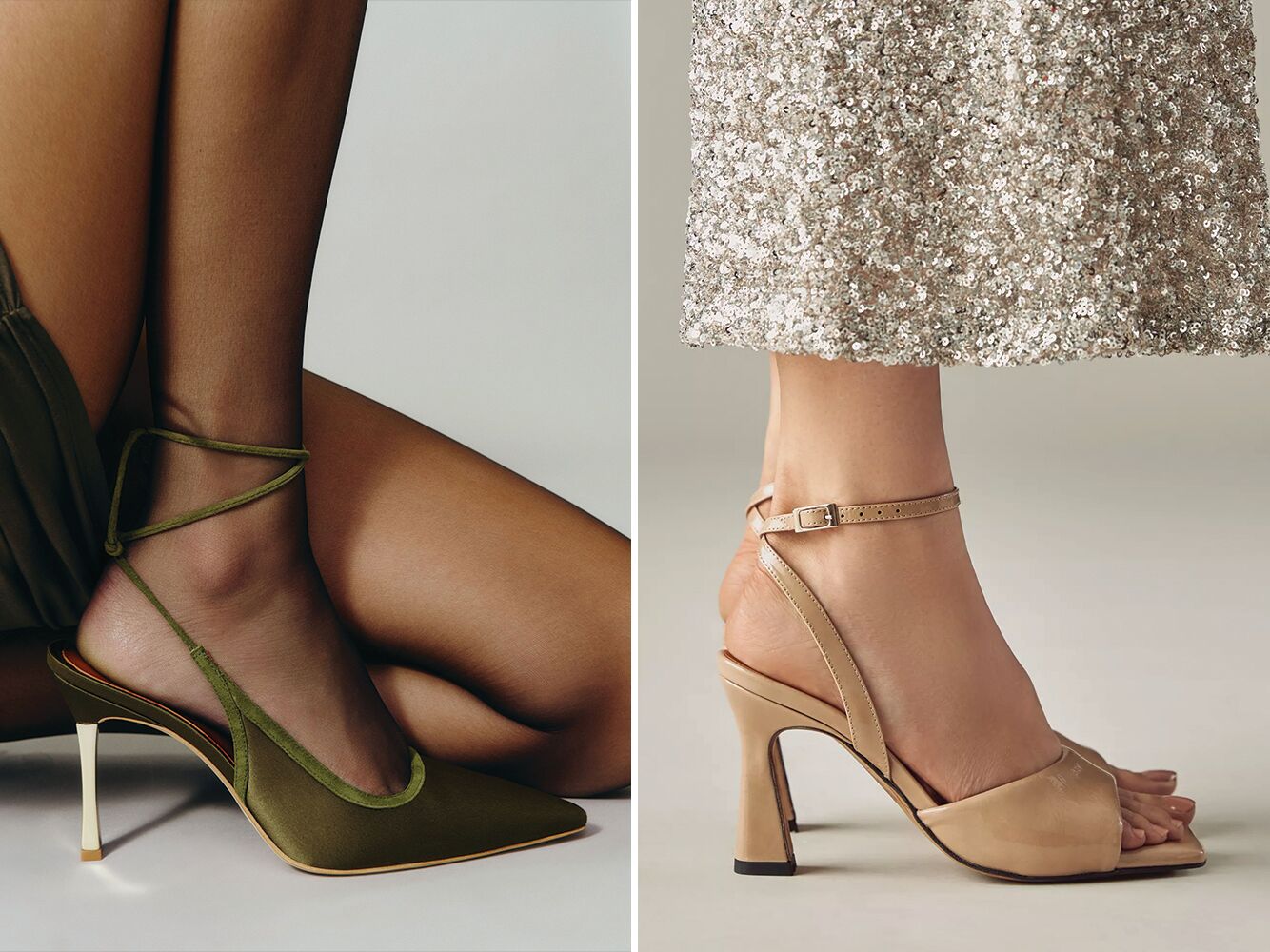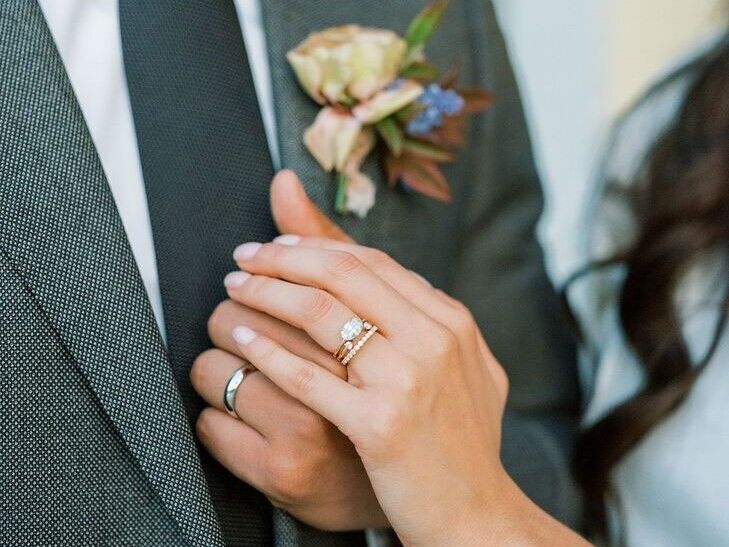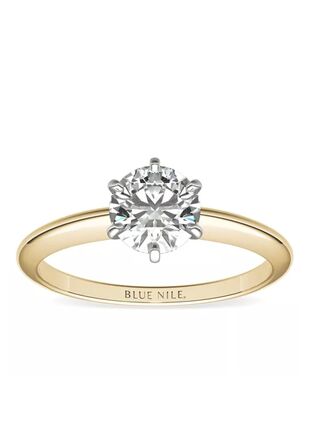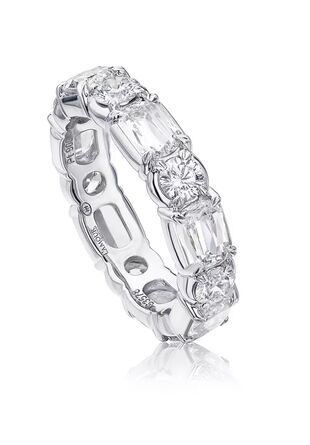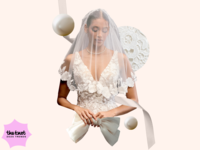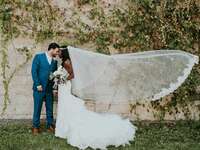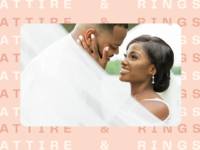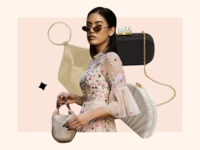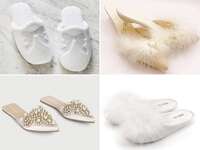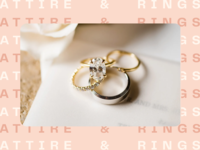What is a Veil? Meaning Behind the Traditional Bridal Accessory
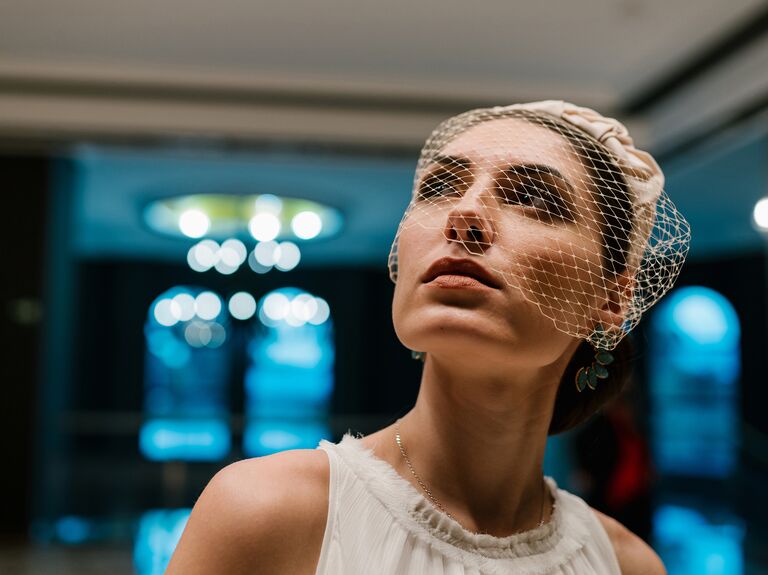
What is a veil? While wedding veils are a commonly worn bridal accessory, they also have a rich history steeped in meaning and wedding tradition. Brides historically have worn veils to symbolize purity, though there is more to the history and meaning of a wedding veil that you may not know, including religious and even superstitious beliefs.
Many brides today choose veils as a fashion statement or even forgo the veil entirely. If you're considering wearing a veil for your wedding, we've covered everything you need to know about the history of wedding veils, how veils translate today, and even whether or not you should wear a veil on your wedding day. Plus, experts weigh in on the wedding veil meaning and the different types of wedding veils.
In this article: What Is a Veil? | Veil Meaning | Modern Veil Tradition | Do I Have to Wear a Veil?
What Is a Veil?
A veil is a bridal hair accessory traditionally worn by nearlyweds on their wedding day. Typically, the bride will wear her veil for the wedding ceremony and remove it for the reception. The Atelier team at Pronovias Group defines a veil as "an accessory, often made from tulle, lace or silk, that is traditionally worn by a bride during her wedding ceremony. It is usually attached to the bride's hair, typically with a comb or headpiece, and can vary in length from a short, face-framing style to a long, dramatic one that extends behind her."
While it may seem like an insignificant detail, a veil means so much more than meets the eye. Sandra Morales, wedding veil designer and owner of Ofrenda Studio, shares, "A veil is more than just a piece of fabric—it is a symbolic, ceremonial object capable of transforming a bride's outfit. Traditionally, veils have represented modesty, mystery and transition between a past and a future. For us, it is also an offering—an intimate, deeply personal gesture that carries meaning beyond tradition."
The history of the bridal veil dates back thousands of years. "In Ancient Rome, brides wore flame-colored veils (the flammeum) to ward off evil spirits," Morales says. "In medieval Europe, veils were a sign of modesty and social status, and in arranged marriages, they sometimes concealed the bride's face until the ceremony was complete. Over time, veils evolved from protective garments into symbolic accessories, shifting in meaning across cultures and generations. Today, a veil is a ceremonial fashion accessory capable of holding this tension between tradition and modernity."
While the decision of whether or not to wear a veil is a personal one, brides may choose to wear a veil for many reasons, including style, tradition and religion. "Ultimately, a veil is what the wearer makes of it—a deeply meaningful addition to the ensemble or simply a beautiful detail that feels just right," Morales explains.
The Veil Meaning in a Wedding
Veils have an abundant history rooted in tradition and even some religious connotations. However, it's important to note that your veil can mean whatever you want it to, and you don't have to subscribe to any beliefs about the veil that don't feel true to you. Simply put, a veil can just be a fun bridal accessory if that's all you want it to be!
What does the veil symbolize?
Beyond its significance in fashion, the tradition of the wedding veil has a rich and nuanced history. While many brides today choose a veil to add drama and style to their wedding day attire, the veil's origins were less rooted in style and more in tradition and even superstition.
"A veil carries layers of symbolism, shaped by history, culture and personal meaning," Morales says. "Traditionally, it has represented modesty, purity, and the transition from one stage of life to another. It can symbolize mystery, protection, transformation, or simply a beautiful gesture of self-expression. More than just a tradition, a veil is an intimate choice that reflects the bride's own story."
We've all seen a movie scene where the groom lifts the bride's veil over her face, and that gesture has some historical significance. Veils often represented a "reveal" of the bride to her husband. "The veil also plays a role in a symbolic 'reveal' moment during the ceremony, especially when the groom lifts the veil before the exchange of vows or the first kiss," the Atelier team says. "This moment can signify the couple's union and the beginning of a new chapter in their lives."
There are even some superstitions associated with wearing a wedding veil over your face. The Atelier team shares, "it was believed that the veil shielded the bride from evil spirits on her wedding day."
What is the significance of a wedding veil in different religions?
While the veil is not necessarily a religious garment, different religions have a special wedding veil symbolism. "In Christian traditions, veils have been linked to purity and the sacred nature of marriage," Morales explains. "In Jewish weddings, some brides wear a badeken veil, symbolizing humility and the groom's commitment beyond physical beauty. In Islamic and Hindu traditions, veiling can represent modesty and reverence. Across different faiths, the veil often serves as a physical and spiritual threshold—a moment of transition between past and future."
How the Wedding Veil Tradition Translates Today
While veils remain a popular accessory, many brides today opt for veil alternatives or forego the veil altogether. Brides have a wide range of both traditional and modern veil trends to choose from.
Do I Have to Wear a Veil for My Wedding?
The decision of veil or no veil all boils down to personal preference. Morales shares, "I believe a veil should feel intentional—worn not out of obligation, but as an extension of the bride's self-expression."
Brides can also choose from elegant veil alternatives, such as headbands, clips, and other bridal hair accessories. Pro tip: Whether or not you choose to wear a veil, be sure to bring your hair accessories to your hair trial so you can ensure your wedding hairstyle works well with your chosen accessories.
Do I have to wear the veil over my face?
Just like the decision to wear a veil is up to you, the decision of how to wear the veil is also up to you. The more traditional way of wearing a veil is to drape it over the face, though this is simply a matter of personal preference, and brides should wear whatever feels most comfortable for them.
"While it is a common tradition for a bride to wear the veil over her face, especially during the ceremony, there are no strict rules about this," the Atelier team at Pronovias Group explains. "It is entirely up to the bride's preference and the style she chooses for her wedding."
Does the length of my wedding veil matter?
The short answer is no. The length of a wedding veil is another decision that is all about personal preference. "While veil lengths don't have strict symbolic meanings, they do influence the overall feel of a bridal look," Morales says.
Long or cathedral veils "are often associated with more formal, traditional or grand weddings, symbolizing a sense of tradition, elegance and a more formal approach to the ceremony," the Atelier team explains. "Birdcage and fingertip-length veils may be seen as more modern or unconventional, often chosen by brides who want a less traditional look, perhaps for a more relaxed or contemporary wedding."
When choosing your veil, it's important to consider the formality and overall vibe of your wedding. If you're unsure about what length veil to go with, your bridal consultant can help. They will likely have different veil length options you can try while shopping for your wedding dress to get an idea of how each length looks with different dresses. You can also look at some celebrity wedding veils for inspiration.
"While the length of a wedding veil can influence the overall feel of a bride's attire, there is no specific rule or meaning associated with each length," the Atelier group explains. "Whether it's a dramatic cathedral veil or a simple birdcage, it's about what makes the bride feel most beautiful and confident on her wedding day."

